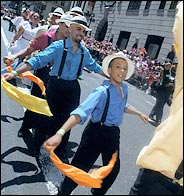|
 |
|
Esta página no está disponible en español. THE NEW YORK TIMESFifth Avenue Moves To A Salsa Beat On Puerto Rican Day: Parade Honors Heritage, Victims Of Sept. 11By ROBERT F. WORTH
June 10, 2002
The 45th National Puerto Rican Day Parade claimed Midtown Manhattan for its own on Sunday, an annual ritual of ethnic pride and raucous celebration. They thronged both sides of Fifth Avenue, waving Puerto Rican flags and swaying to a booming Latin pulse. Along the avenue itself, azure, white and crimson floats bobbed under the weight of whirling dancers, while uniformed marching bands strutted and politicians grinned and waved under a baking sun. Advertisement The 45th National Puerto Rican Day Parade claimed Midtown Manhattan for its own yesterday, an annual ritual of ethnic pride and raucous celebration attended by thousands of spectators. But while the parade was as joyous as ever, the crowds were smaller than they have been in recent years, a change many paradegoers attributed to the Sept. 11 terrorist attack. The parade was also shadowed by the violence that marred it two years ago, when 50 women were groped and many of them had articles of clothing torn off by a throng of young men in Central Park. This year as last, a large police contingent kept close watch over the festivities and barred people from large parts of the park during the march, which began at 11 a.m. and continued until early evening. Yesterday, the police said, 3 people were arrested for groping, a misdemeanor sexual offense. Fourteen people were arrested for disorderly conduct and assault, and 38 were issued summonses for public urination and other minor offenses. "Some people are avoiding crowds because of 9/11," said Ruben Hernandez, a parole officer who said he had attended the parade every year since he moved to New York from Puerto Rico 20 years ago. "Usually I can't even get to where I'm standing now," he added, gesturing out at the relatively thin crowd surrounding him at Fifth Avenue and 59th Street. If the September attack – and recent warnings of possible new ones – kept some people home yesterday, they also provided a renewed reason for celebrating life and remembering those who were lost. As groups of Puerto Rican police officers and firefighters marched past, some with pictures of colleagues who died on Sept. 11 tucked in the front of their caps, the crowds seemed to redouble their cheers. One fire truck tooted its horn to a salsa beat, and spectators picked up the rhythm with their claps and whistles. Parade organizers dedicated the day's march to all of New York's Puerto Rican police officers and firefighters. Nicholas Estavillo, the New York Police Department's chief of patrol, and Representative José E. Serrano of the Bronx were the grand marshals. The crowd burst into wild applause when former mayor Rudolph W. Giuliani appeared, marching alongside Mayor Michael R. Bloomberg and ducking into the crowd now and then to shake hands. Johnny Mercado, 33, a cook who said he had once applied for a job at Windows on the World, said: "I think the attacks make this year's parade special. I think we're all so happy and thankful to be here." Some said the smaller crowds made for a better parade. "You can breathe a lot easier this year," said Adrian Hernandez, 28, who was wearing a Puerto Rican flag as a cape. He said he had attended the parade nearly ever year since he was 9. "Usually it's so crowded you can't even get through to see things." And several women said they were happy to have so many police officers watching over the proceedings. After the 2000 parade, 18 men were convicted or pleaded guilty in the attacks on women. The men were given sentences ranging from probation to five years in prison. "You could sense that security wasn't so strong that year," said Priscilla Chen, 18, who was at the 2000 parade. "Since then, there's cops everywhere and it feels a lot safer." Along Fifth Avenue, the odors of cooking meat and marijuana drifted from the crowd as Latin pop stars belted songs from their floats, and young men and women danced in the street. Politics is always part of a New York parade, but in this election year it was particularly apparent. Gov. George E. Pataki, who last year announced his opposition to the United States Navy's use of the Puerto Rican island of Vieques for bombing exercises, marched with politicians from Vieques. Crowds waving the Vieques flag whooped their approval as he passed. Close behind the governor were members of 1199 S.E.I.U., the health and human services union, which has a large percentage of Hispanic members and has endorsed Mr. Pataki's re-election bid. H. Carl McCall and Andrew M. Cuomo, who are vying for the Democratic nomination to run against Mr. Pataki, also marched. To some New Yorkers, the parade – which ran from 44th Street to 86th Street, was little more than an obstacle. "It is traffic mayhem," said Paul Felix, a 25 year-old consultant who was returning from a bike ride in the park and found himself unable to pass through the marchers to his home on the Upper East Side. Still, the overwhelming emotion was one of pride and celebration. "We're here to get our priorities straight – to celebrate people," Mr. Mercado said from the sidelines. "That's what really matters."
|

 ----------
----------